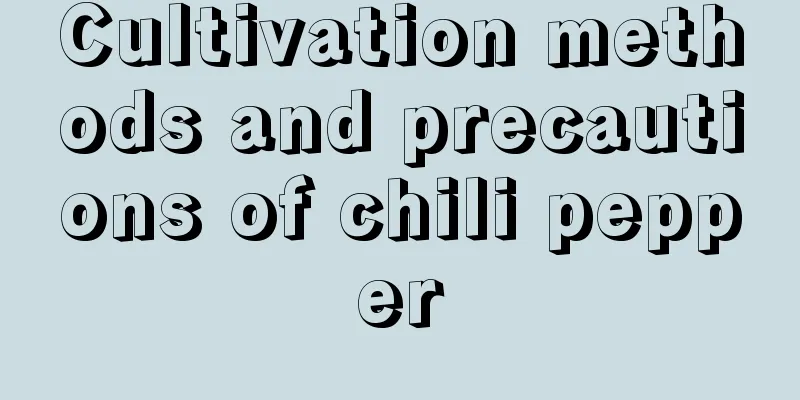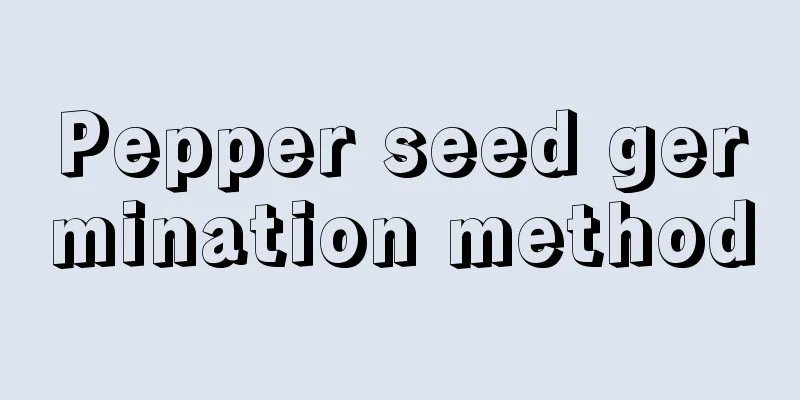Cultivation methods and precautions of chili pepper

1. Maintenance methods1. Soil: When breeding, you must choose soil suitable for its growth. The soil needs to be fine, without too large lumps, and also have good air permeability. Do not use soil that is too sticky. If you prepare the soil yourself, you need to disinfect it in advance. 2. Watering: It is drought-resistant, but at the same time it is very afraid of waterlogging, so it should be watered in small amounts during maintenance. If there is excess water in the soil, its leaves will easily fall off, and in serious cases it may even die. 3. Light: Chili pepper likes a growing environment with good light, and it can also accept a low-light environment. When planting, you must choose a good location and try to ensure sufficient light, which is beneficial to its growth. 4. Fertilization: In order to make it grow better, it is generally necessary to fertilize it every half a month or so, and you can apply organic fertilizer to it. During its flowering and fruiting period, it needs to be sprayed with some potassium dihydrogen phosphate. 2. Breeding techniques1. Seeding propagation: The propagation of chili pepper is mostly done by sowing, and you should choose seeds that are full enough. Before planting, put it in warm water and wait until the seeds turn white before planting. You can use the broadcasting method when planting, and cover with a thin layer of soil after sowing, otherwise it will be difficult to germinate. 2. Cutting propagation: It is also possible to use branches for propagation, but you must choose healthy branches. The substrate must also be clean. Do not use saline-alkali soil. Insert the branches into the substrate and adjust the temperature to 18-25℃ for easiest rooting. 3. Problem diagnosis and treatment1. Anthracnose: It is easy to occur when it rains a lot and the temperature is high. If it is not prevented and controlled in time, the yield will be reduced. The medicine should be used as soon as possible after the onset of the disease. You can use Aimu water-dispersible granules for prevention and treatment. 2. Pests: When there are pests on the chili pepper plants, it will not only affect the yield, but also hinder its normal growth, so you need to buy special and regular pesticides to spray them. IV. Other issues1. Can it be grown in potted plants? It can be grown in potted plants. When growing it in a potted plant, you should choose a pot of suitable size, and the diameter of the pot should be at least about 15-25cm. 2. Pruning: After harvesting the chili peppers, cut off their side branches. And also trim off some diseased and old leaves, so as to reduce unnecessary nutrient loss. |
<<: Cultivation methods and precautions of Changchun oilseed vine
>>: Orange Monroe cultivation methods and precautions
Recommend
Cultivation methods and precautions of tiger thorn bonsai
Euphorbia milii is an ornamental flower that is v...
A friend gave me a pot when he moved. It absorbs formaldehyde and improves Feng Shui. If you give it right, you will get rich. If you give it wrong...
Put a money tree in your new house to bring money...
What are the breeding methods and precautions for mountain turtles?
Mountain turtle breeding method The tortoise-shel...
What to do if the green leaves grow too long
Natural Regulation The reason for the green plant...
What to do after Magnolia blooms
1. Specific period This plant mainly blooms aroun...
How to Grow Aloe Vera
1. Prepare the soil 1. Flower pot: It is best to ...
How often should I water lilies? Do I need to water them every day?
How often should lilies be watered? The amount of...
The efficacy and function of Yanhusuo
Edible value Yanhusuo wine Take an appropriate am...
Why don't my peonies bloom?
1. Improper pruning 1. Reason: When the peony bra...
Why don't marigolds bloom?
Marigold blooms The flowering period of Wanshou i...
How to plant peacock grass seeds
1. Sowing time There is no clear limit for sowing...
How to raise Tia
Farming methods Growth habit Succulent plants lik...
The difference between Jade Tree and Swallow Palm
1. Difference between stems The trunk of the jade...
Differences between Oxalis and Alfalfa
1. Different varieties Oxalis belongs to the Oxal...
How to dig wild camellia piles
1. Time Selection When digging up camellia stumps...









